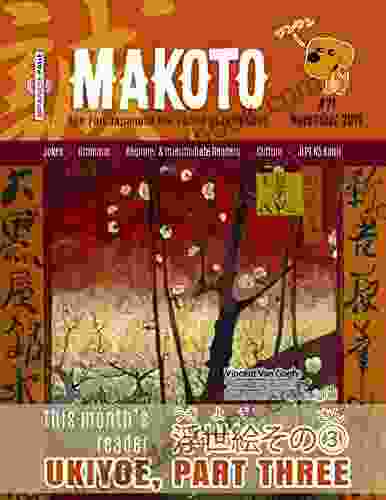The Fun Japanese Not Found In Textbooks: A Comprehensive Guide to Colloquialisms, Slang, and Cultural Expressions

4.8 out of 5
| Language | : | English |
| File size | : | 3932 KB |
| Text-to-Speech | : | Enabled |
| Screen Reader | : | Supported |
| Enhanced typesetting | : | Enabled |
| Print length | : | 106 pages |
| Lending | : | Enabled |
| Item Weight | : | 1.54 pounds |
| Dimensions | : | 5.04 x 0.94 x 8.11 inches |
Learning Japanese through textbooks and formal classes is essential, but it's only the tip of the iceberg. To truly master the language and immerse yourself in Japanese culture, you need to venture beyond the confines of textbooks and explore the vibrant world of colloquialisms, slang, and cultural expressions.
These informal modes of communication offer a glimpse into the everyday lives and perspectives of native speakers. They add color, humor, and depth to your conversations, allowing you to connect with Japanese people on a more personal level. Moreover, understanding these expressions will help you navigate cultural nuances and avoid misunderstandings.
In this comprehensive guide, we will delve into the fascinating world of Japanese colloquialisms, slang, and cultural expressions. We will explore their meanings, origins, and usage, providing you with a practical reference that will enhance your communication skills and deepen your appreciation for Japanese culture.
Colloquialisms
Colloquialisms are informal expressions that are commonly used in everyday speech. They often have a more casual and relaxed tone than formal language, and they can vary significantly from region to region.
Here are some common Japanese colloquialisms:
- やばい (yabai): This versatile expression can mean anything from "amazing" to "terrible," depending on the context.
- マジ (maji): Short for "まじで" (majide),this word is used to emphasize something or express surprise.
- ウケる (ukeru): This expression means "to find something funny" or "to be entertained."
- やばいよ (yaba yo): This is a more emphatic form of "yabai," often used to express excitement or concern.
- よろしく (yoroshiku): This phrase is commonly used as a greeting or a way to say "nice to meet you."
Slang
Slang is a type of informal language that is often used by specific groups of people, such as teenagers, students, or certain professions. It is often characterized by its creativity and humor, and it can change rapidly over time.
Here are some examples of Japanese slang:
- ダサい (dasai): This word means "uncool" or "out of fashion."
- チャラい (chara i): This expression is used to describe someone who is superficial or flirtatious.
- ガチ (gachi): This word means "serious" or "for real."
- アゲアゲ (ageage): This expression is used to describe something that is exciting or uplifting.
- イキリ (ikiri): This word is used to describe someone who is pretending to be tough or cool.
Cultural Expressions
Cultural expressions are words or phrases that are deeply rooted in Japanese culture and history. They often reflect the values, beliefs, and customs of Japanese society.
Here are some examples of Japanese cultural expressions:
- いただきます (itadakimasu): This phrase is said before eating a meal and expresses gratitude for the food.
- ごちそうさま (gochisousama): This phrase is said after eating a meal and expresses appreciation for the food.
- お元気ですか (ogenki desu ka): This phrase is used to greet someone and ask how they are ng.
- ありがとうございます (arigatou gozaimasu): This phrase is used to express gratitude or thank someone.
- すみません (sumimasen): This phrase is used to apologize or ask for something.
Using Colloquialisms, Slang, and Cultural Expressions
When using colloquialisms, slang, and cultural expressions, it is important to be mindful of the context and the audience you are speaking to. Some expresiones are only appropriate in informal settings, while others may be considered rude or offensive in certain situations.
It is also important to note that colloquialisms and slang can change over time, so it is a good idea to stay up-to-date with the latest expressions by watching Japanese TV shows, movies, and listening to Japanese music.
By incorporating colloquialisms, slang, and cultural expressions into your Japanese communication, you will not only enhance your fluency but also gain a deeper understanding of Japanese culture and society. These informal modes of expression will help you connect with native speakers on a more personal level and navigate the nuances of Japanese communication with confidence.
So, embrace the fun Japanese not found in textbooks and unlock a new dimension of language and culture. Experiment with different expressions, observe how native speakers use them, and don't be afraid to make mistakes. The journey of learning Japanese is a continuous one, and the more you immerse yourself in the language, the more you will discover its hidden gems.
4.8 out of 5
| Language | : | English |
| File size | : | 3932 KB |
| Text-to-Speech | : | Enabled |
| Screen Reader | : | Supported |
| Enhanced typesetting | : | Enabled |
| Print length | : | 106 pages |
| Lending | : | Enabled |
| Item Weight | : | 1.54 pounds |
| Dimensions | : | 5.04 x 0.94 x 8.11 inches |
Do you want to contribute by writing guest posts on this blog?
Please contact us and send us a resume of previous articles that you have written.
 Book
Book Chapter
Chapter Reader
Reader E-book
E-book Magazine
Magazine Paragraph
Paragraph Bookmark
Bookmark Bibliography
Bibliography Preface
Preface Synopsis
Synopsis Annotation
Annotation Manuscript
Manuscript Tome
Tome Bestseller
Bestseller Classics
Classics Library card
Library card Reference
Reference Encyclopedia
Encyclopedia Character
Character Resolution
Resolution Catalog
Catalog Card Catalog
Card Catalog Borrowing
Borrowing Stacks
Stacks Periodicals
Periodicals Study
Study Research
Research Scholarly
Scholarly Journals
Journals Reading Room
Reading Room Rare Books
Rare Books Special Collections
Special Collections Thesis
Thesis Dissertation
Dissertation Storytelling
Storytelling Awards
Awards Reading List
Reading List Book Club
Book Club Theory
Theory Textbooks
Textbooks Grace Clemens
Grace Clemens William March
William March Thomas G Gunning
Thomas G Gunning Diane Ethier
Diane Ethier Karin Perry
Karin Perry Noel Douglas Orput
Noel Douglas Orput Peter J Katzenstein
Peter J Katzenstein Jeff Thomas
Jeff Thomas Tom Trush
Tom Trush Candace Cotton
Candace Cotton Thomas E Patterson
Thomas E Patterson David L Smith
David L Smith Michael L Dertouzos
Michael L Dertouzos Stephanie Evanovich
Stephanie Evanovich David Ferry
David Ferry Nikki Landis
Nikki Landis Jj Knight
Jj Knight Ben Kane
Ben Kane M C Chagla
M C Chagla Karyne E Messina
Karyne E Messina
Light bulbAdvertise smarter! Our strategic ad space ensures maximum exposure. Reserve your spot today!
 Yukio MishimaFollow ·3.4k
Yukio MishimaFollow ·3.4k Giovanni MitchellFollow ·7.4k
Giovanni MitchellFollow ·7.4k Desmond FosterFollow ·19.6k
Desmond FosterFollow ·19.6k Manuel ButlerFollow ·16.1k
Manuel ButlerFollow ·16.1k Henry David ThoreauFollow ·3.3k
Henry David ThoreauFollow ·3.3k Jack PowellFollow ·11.5k
Jack PowellFollow ·11.5k Bryce FosterFollow ·2.6k
Bryce FosterFollow ·2.6k Owen SimmonsFollow ·8.7k
Owen SimmonsFollow ·8.7k

 Howard Powell
Howard PowellDk Workbooks Science Third Grade: An In-Depth Exploration...
Science education plays a...

 Everett Bell
Everett BellLearn to Play Bluegrass Dobro Guitar: A Comprehensive...
: Bluegrass Dobro, A Story of...

 Jeffrey Cox
Jeffrey CoxHow the Raccoon Got His Mask
The raccoon, with its...

 George Bell
George BellHannah Meets Ruby Hannah Out West: An Adventure-Filled...
Hannah Meets...
4.8 out of 5
| Language | : | English |
| File size | : | 3932 KB |
| Text-to-Speech | : | Enabled |
| Screen Reader | : | Supported |
| Enhanced typesetting | : | Enabled |
| Print length | : | 106 pages |
| Lending | : | Enabled |
| Item Weight | : | 1.54 pounds |
| Dimensions | : | 5.04 x 0.94 x 8.11 inches |
















